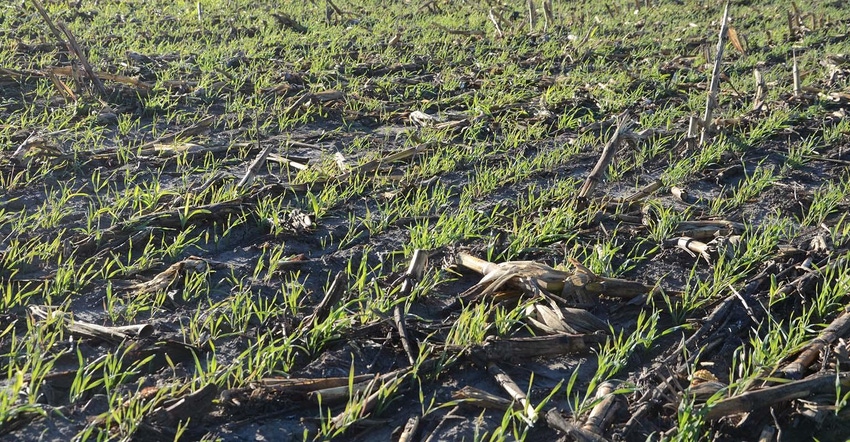
Farmers who plant certain cover crops on prevent plant acres after bad weather prohibits timely planting would have more flexibility to avoid facing crop insurance penalties under a bipartisan bill introduced in the U.S. Senate.
The Cover Crop Flexibility Act of 2021 introduced by Sens. Debbie Stabenow, D-Mich., chairwoman of the Senate Committee on Agriculture, Nutrition, and Forestry, and John Thune, R-S.D., would permanently lift crop insurance penalties for farmers who plant cover crops that can be used for animal feed or livestock grazing in response to extreme weather events.
Currently, crop insurance penalizes farmers for harvesting cover crops that can be used for livestock grazing or animal feed when farmers can’t plant their crops for the season because of bad weather. The legislation would permanently lift this restrictive rule and provide certainty if farmers face poor planting conditions.
This legislation was inspired by Thune and Stabenow’s 2019 effort that led the USDA to make an administrative change that allowed for penalty-free haying and grazing, which significantly benefited states like South Dakota and Michigan. In 2020, Thune and Stabenow again requested that USDA move up the November 1 date to September 1, but the department only provided flexibility in certain counties in South Dakota and North Dakota. This bill would provide a permanent solution to this issue and create greater certainty for U.S. producers.
The Cover Crop Flexibility Act would:
Remove a prohibition on grazing or harvesting cover crops for hay or silage and eliminate an arbitrary date that allowed farmers with longer growing seasons more opportunities than those in northern states. Farmers would still have to plant cover crops on approved lists to prevent manipulation of the flexibility and avoid harvesting during the primary nesting season of local birds.
Allow USDA to include cover crop seed costs when it sets the factor that is used to calculate the prevented planting indemnity. The current formula only allows USDA to consider pre-planting costs when setting the factor, so the cost of cover crop seed is a potential barrier for farmers who are already facing the effects of a natural disaster.
Direct USDA to conduct a study to examine the extent that cover crops reduce risks of prevented planting and other crop insurance losses. If the study finds risk reductions, it allows USDA to adjust prevented planting factors or provide policies with appropriate lower premiums for farmers using cover crops.
Thune says South Dakota producers have faced difficult growing conditions in recent years, and the November 1 rule for cover crops on prevented plant acres only made the situation more difficult. “This common-sense legislation would help address a barrier to cover crop adaptation and level the playing field for producers in northern states like South Dakota,” he says.
“Historic rainfall in 2019 caused many farmers to miss the planting season,” Stabenow says. “When extreme weather gets in the way of planting, farmers aren’t able to grow beneficial cover crops without facing a crop insurance penalty. This commonsense change permanently fixes that problem and is a win for the environment and for farmers.”
Historic rainfall in the spring of 2019 prevented planting on nearly a million acres of Michigan farmland, leading to shortages in hay and forages later in the season.
“Farmers in Michigan are resilient and frequently face weather extremes, but even they sometimes need help when severe conditions prevent them from producing a crop at all,” says Carl Bednarski, president of Michigan Farm Bureau. “Stabenow's bill will provide farmers in Michigan and across the country with much-needed flexibility during critical weather-events like they experienced in 2019.”
Planting cover crops helps farmers get value from their land through grazing and harvesting. It also improves soil productivity and prevents weeds from overgrowing in fields. Cover crops also provide important climate and conservation benefits by storing harmful carbon pollution in the soil and reducing erosion and runoff into the Great Lakes. Because cover cropping makes farmland more resilient against flooding and drought, it has the potential to lower crop insurance claims, premiums and taxpayer costs.
The Cover Crop Flexibility Act of 2021 is supported by 37 farm and conservation organizations, including the National Milk Producers Federation, National Cattlemen’s Beef Association, U.S. Cattlemen’s Association, American Sheep Industry Association, National Association of Wheat Growers, National Corn Growers Association, American Soybean Association, American Farm Bureau Federation and National Farmers Union.
“This legislation will give farmers some much-needed flexibility in managing their land to deal with unforeseen weather impacts like what we experienced in 2019,” says Randy Poll, Michigan Corn Growers Association president. “It also allows us to better protect Michigan’s land by strategically using cover crops to improve soil health and fertility, suppress weeds, and reduce soil erosion.
“Planting cover crops is a conservation strategy thousands of soy growers are using very effectively for long term soil health and farm management, and we appreciate the bipartisan approach to provide crop insurance flexibility,” says Heather Feuerstein, Michigan Soybean Association president. “This legislation permanently provides that needed flexibility to encourage cover crops and allow some grazing and harvesting on prevented plant acres. Soybean farmers need these solutions to improve their farm risk management strategy.”
“Cover crops provide significant benefits to all of us in terms of erosion control, nutrient retention and helping to build soil health through carbon capture and increased soil organic matter,” says Madhu Anderson, director of government relations for The Nature Conservancy in Michigan. “The Nature Conservancy strongly supports this legislation because we believe it will encourage more farmers to make cover crops a part of their cropping system.”
The bill maintains regulations on grazing and forage harvesting until the end of primary nesting periods of local birds.
About the Author(s)
You May Also Like






